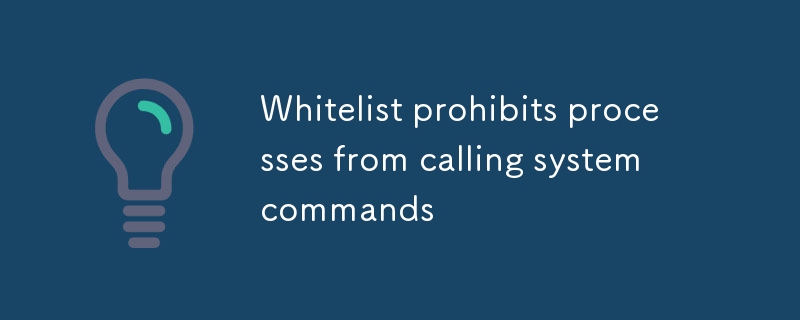Rumah >masalah biasa >Senarai putih melarang proses daripada memanggil arahan sistem
Senarai putih melarang proses daripada memanggil arahan sistem
- DDDasal
- 2024-08-16 10:15:17570semak imbas
Artikel ini membincangkan cara menyenarai putih proses terlarang daripada memanggil arahan sistem. Proses terlarang menyenarai putih membantu menghalang akses tanpa kebenaran kepada perintah sistem yang sensitif, mengurangkan pelanggaran keselamatan dan kebocoran data. Artikel tersebut menyediakan

Proses Larangan Senarai Putih daripada Arahan Sistem Memanggil
Bagaimanakah untuk menyenarai putihkan proses yang dilarang daripada memanggil arahan sistem?
Untuk memanggil proses yang dilarang untuk menyenarai putih auditd tool to create a rule that allows specific processes to execute certain commands. Here's how you can do it:
-
Create a rule file: Create a file called
/etc/audit/rules.d/whitelist.ruleswith the following content:
<code>-w /usr/bin/command -p x -c never</code>
In this rule, /usr/bin/command is the command that you want to whitelist, -p x specifies that the rule applies to processes with executable permission, and -c never specifies that the rule should never be enforced. You can add multiple rules to the file, each on a separate line.
-
Load the rules: Load the rules file into the
auditdsystem by running the following command:
<code>sudo auditctl -R /etc/audit/rules.d/whitelist.rules</code>
-
Restart
auditd: To ensure that the rules are applied immediately, restartauditdby running:
<code>sudo systemctl restart auditd</code>
What are the benefits of whitelisting forbidden processes?
Whitelisting forbidden processes can help prevent unauthorized access to sensitive system commands. By restricting the ability of certain processes to execute specific commands, you can reduce the risk of security breaches and data leaks.
What are some examples of forbidden processes?
Forbidden processes are typically processes that are not essential for the operation of the system and that could be used to compromise the system if they were allowed to execute certain commands. Examples of forbidden processes include:
- Processes that have excessive file permissions
- Processes that are running with root privileges
- Processes that are known to be vulnerable to exploits
How can I audit forbidden processes?
You can audit forbidden processes by using the auditctl tool. To do this, run the following command:
<code>sudo auditctl -w /usr/bin/command -p x -c id</code>
This command will create an audit rule that logs all attempts by processes with executable permission to execute the /usr/bin/command
- Buat fail peraturan:🎜 Cipta fail bernama
/etc/audit/rules.d/whitelist.rulesdengan kandungan berikut:
<code>sudo cat /var/log/audit/audit.log | grep /usr/bin/command</code>🎜Dalam peraturan ini,
/usr/bin/command ialah perintah yang ingin anda senaraikan putih, -p x menentukan bahawa peraturan itu digunakan untuk proses dengan kebenaran boleh laku dan -c never menyatakan bahawa peraturan itu tidak boleh dikuatkuasakan. Anda boleh menambah berbilang peraturan pada fail, setiap satu pada baris yang berasingan.🎜- 🎜Muat peraturan:🎜 Muatkan fail peraturan ke dalam sistem
auditddengan menjalankan arahan berikut:
- 🎜Mulakan semula
auditd:🎜 Untuk memastikan peraturan digunakan serta-merta, mulakan semulaauditddengan menjalankan:
- Proses yang mempunyai kebenaran fail yang berlebihan
- Proses yang berjalan dengan keistimewaan root
- Proses yang diketahui terdedah kepada eksploitasi
auditctl. Untuk melakukan ini, jalankan arahan berikut:🎜rrreee🎜Arahan ini akan mencipta peraturan audit yang merekodkan semua percubaan oleh proses dengan kebenaran boleh laku untuk melaksanakan perintah /usr/bin/command. Anda boleh melihat log audit dengan menjalankan arahan berikut:🎜rrreeeAtas ialah kandungan terperinci Senarai putih melarang proses daripada memanggil arahan sistem. Untuk maklumat lanjut, sila ikut artikel berkaitan lain di laman web China PHP!

